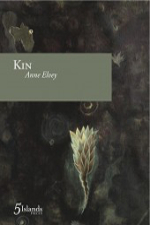
Kin by Anne Elvey
Five Islands Press, 2014
The kinship Elvey forges between her poems and ecological criticism lends both rigour and reverence to her first full-length collection of poetry. There is a radiant stasis at the core of her poems that encourages the reader to listen to the susurration of multiple, overlapping conversations to which Elvey is contributing.
Elvey is a significant voice in Australian ecological theology. Her research and poetry blog, Leaf Litter, charts a series of important papers and pertinent thoughts about the link between ‘teaching, research and writing as a response to ecological crisis’. The most recent feature of this blog is Elvey’s presentation from the Ecofaith conference in May 2014, entitled ‘On (not) speaking about God ecologically’. In this paper, she considers scholarship on the kinship model, most importantly, extending eco-theologian Denis Edwards’ work on ‘challenging the model of domination and exploitation’. Elvey’s Kin puts into practice Edwards’ suggestion that we ‘have much to learn about kin-ship from the traditional cultures of indigenous peoples.’ Her ‘Claimed by Country’ sequence addresses, in her own words, her responses as:
a non-Aboriginal woman to the places I lived in and visited and my sense of being “claimed” in part through a practice of attentiveness to the places that are “country” for their Aboriginal, traditional owners.
She references ‘this practice of attentiveness’ to Miriam Rose Ungunmerr Bau-mann and responds to the Aboriginal people’s practice of deep listening or ‘dadirri’. In ‘Claimed by Country 2’, Elvey contemplates the ways that she is not alone in place or time:
But now, three trees on the city’s edge – when the Kalamundu bus lurches toward Perth, coming into, out of country, with one hundred and fifty years of settler shame my ancestors multiplied on Nyoogah land – three trees as if three gnarled concierges of country is this the colonising moment once again? greet me as if they know me. I wonder should I call out in return?
In this suite, Elvey puts faith in the relationality of being claimed. She applies a postcolonial ecocriticism in her poetic utterances as she moves ‘into, out of/country’, haunted by ‘settler shame’. Deborah Bird Rose has argued that ‘language is full of ghosts’1 and Elvey’s ‘Claimed By Country’ poems are haunted by the ethnographic voices she enables ‘on Nyoogah land’. The narrator considers adding her voice but she chooses silence, allowing Indigenous subjectivity to in-habit the space.
Silence is a motif made exquisitely self-conscious in many of Elvey’s poems; in this way, the narrator becomes witness to the events. At its heart, Elvey’s Kin encourages listening and reconnecting with the earth and its others. In the only prose poem in the collection, ‘Receiving a past’, the narrator is mute:
I wind a music box with my heart wrapped round the key, to shield the skin of my palm. It would burn on a sentence spoke, I cannot respond. The mirror is face to the soil. The frame is filigree. On its reverse ants outline a world.
The juxtaposition of music and soundlessness is framed by the mirror; its shiny front resting on the soil, exposing its ‘reverse’. The chain of ants in the fourth line rings ‘a world’ between Dreamtime and Picnic at Hanging Rock. It is a stunning moment beyond language when, finally, ‘a/small face looks up, mute’.
- Stated in Bird Rose’s keynote lecture at the Contempo-rary Women Writers Association Conference, Deakin and RMIT Universities, Melbourne, July 2014 ↩













